

ACT Observer Exercise. About a year or so ago, I came across a particularly neat-sounding exercise for Acceptance and Commitment Therapy, or ACT.
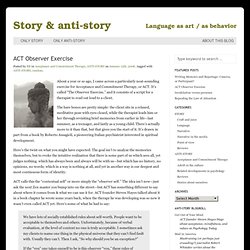
It’s called “The Observer Exercise,” and it consists of a script for a therapist to read out loud to a client. The bare bones are pretty simple: the client sits in a relaxed, meditative pose with eyes closed, while the therapist leads him or her through revisiting brief memories from earlier in life—last summer, as a teenager, and lastly as a young child. There’s actually more to it than that, but that gives you the start of it. It’s drawn in part from a book by Roberto Assagioli, a pioneering Italian psychiatrist interested in spiritual development. ACT calls this the “contextual self” or more simply the “observer self.” We have lots of socially established rules about self-worth. The observer self is referred to in just about every ACT book there is, including the ACT self-help workbook, Get Out of Your Head and Into Your Life.
MP3 file: ACT Observer Exercise. Anxietyhappens.com. Acceptance and Commitment Therapy (ACT) Trainings. Acceptance and commitment therapy. Noam Shpancer describes acceptance and commitment therapy as getting to know unpleasant feelings, then learning not to act upon them, and to not avoid situations where they are invoked.
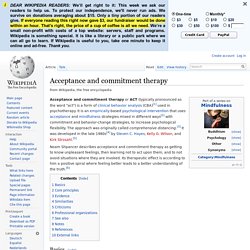
Its therapeutic effect is according to him a positive spiral where feeling better leads to a better understanding of the truth.[6] Basics[edit] ACT is developed within a pragmatic philosophy called functional contextualism. ACT is based on relational frame theory (RFT), a comprehensive theory of language and cognition that is an offshoot of behavior analysis. ACT differs from traditional cognitive behavioral therapy (CBT) in that rather than trying to teach people to better control their thoughts, feelings, sensations, memories and other private events, ACT teaches them to "just notice," accept, and embrace their private events, especially previously unwanted ones. Fusion with your thoughtsEvaluation of experienceAvoidance of your experienceReason-giving for your behavior Core principles[edit] Evidence[edit] Acceptance and Commitment Therapy.
Acceptance & Commitment Therapy Training. Home > Acceptance & Commitment Therapy What is Acceptance & Commitment Therapy?
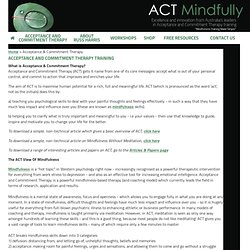
Acceptance and Commitment Therapy (ACT) gets it name from one of its core messages: accept what is out of your personal control, and commit to action that improves and enriches your life. The aim of ACT is to maximise human potential for a rich, full and meaningful life. ACT (which is pronounced as the word 'act', not as the initials) does this by: a) teaching you psychological skills to deal with your painful thoughts and feelings effectively - in such a way that they have much less impact and influence over you (these are known as mindfulness skills). b) helping you to clarify what is truly important and meaningful to you - i.e your values - then use that knowledge to guide, inspire and motivate you to change your life for the better.
Acceptance and Commitment Therapy. ACT differs from CBT in that instead of challenging distressing thoughts by looking for evidence and coming up with a more rational response (CBT), in ACT, the thought is accepted as a thought, e.g.
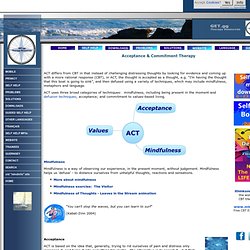
“I’m having the thought that this boat is going to sink”, and then defused using a variety of techniques, which may include mindfulness, metaphors and language. ACT uses three broad categories of techniques: mindfulness, including being present in the moment and defusion techniques; acceptance; and commitment to values-based living. Mindfulness Mindfulness is a way of observing our experience, in the present moment, without judgement. Mindfulness helps us 'defuse' - to distance ourselves from unhelpful thoughts, reactions and sensations. "You can't stop the waves, but you can learn to surf" (Kabat-Zinn 2004) Acceptance and Commitment Therapy, Core Processes, Mindfulness and ACT.
Acceptance and commitment therapy (ACT) is a third wave behavioral therapy (along with dialectical behavior therapy and mindfulness based cognitive therapy) that uses mindfulness skills to develop psychological flexibility and helps clarify and direct values-guided behavior.
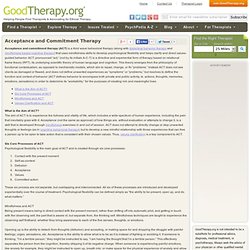
ACT, pronounced “act,” (not by its initials A-C-T) is a directive and experiential form of therapy based on relational frame theory (RFT), its underlying scientific theory of human language and cognition. This theory emerges from the philosophy of functional contextualism, as opposed to mechanistic models, which aim to repair, change, or fix “problems.” Acceptance and Commitment Therapy (ACT) This Special Interest Branch of BABCP focuses on promoting the practice of Acceptance and Commitment Therapy in the United Kingdom, as well as supporting research and training in contextual behavioural science.
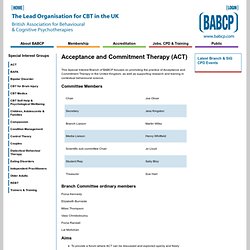
Committee Members Branch Committee ordinary members Fiona Kennedy Elizabeth Burnside Miles Thompson Vaso Christodoulou Fiona Randall Lai Mollohan Aims. About ACT. Printer-friendly versionSend by email Psychological Inflexibility: An ACT View of Suffering The core conception of ACT is that psychological suffering is usually caused by the interface between human language and cognition, and the control of human behavior by direct experience.
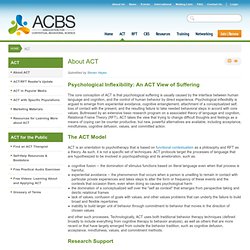
Psychological inflexibility is argued to emerge from experiential avoidance, cognitive entanglement, attachment of a conceptualized self, loss of contact with the present, and the resulting failure to take needed behavioral steps in accord with core values.